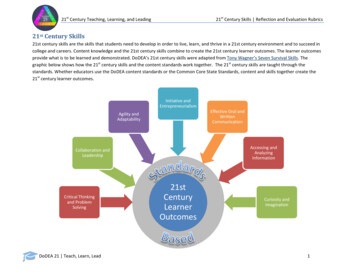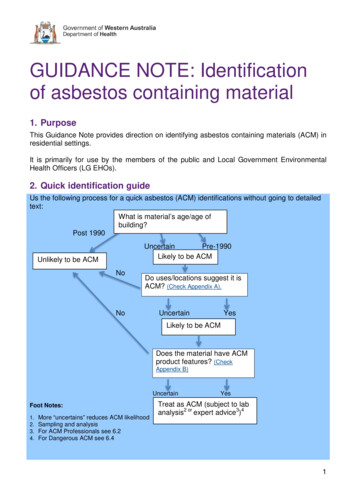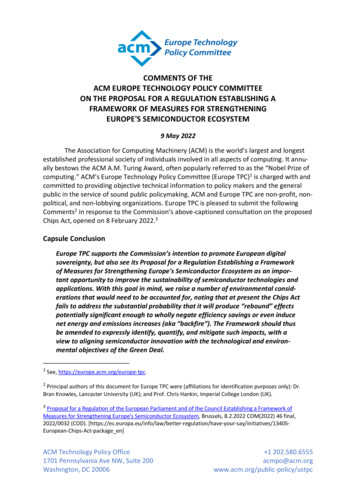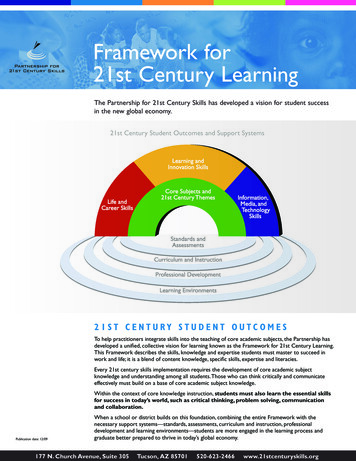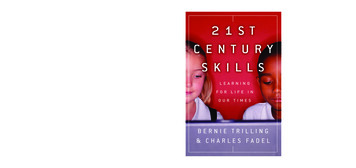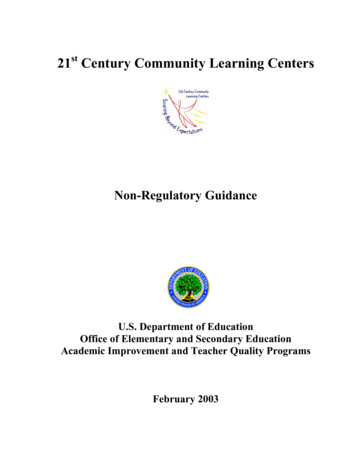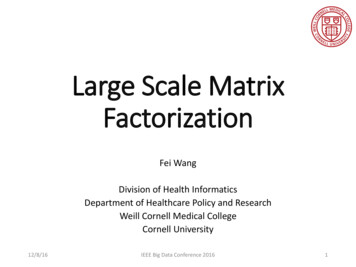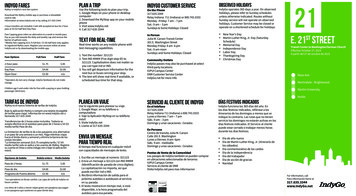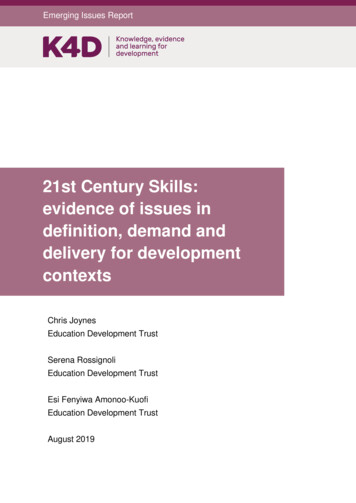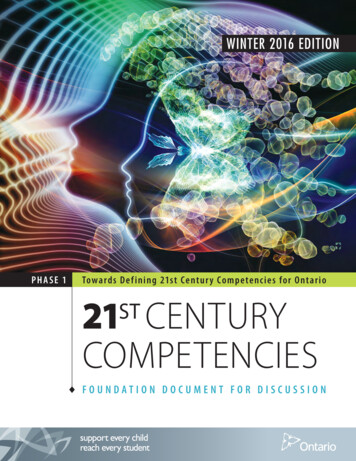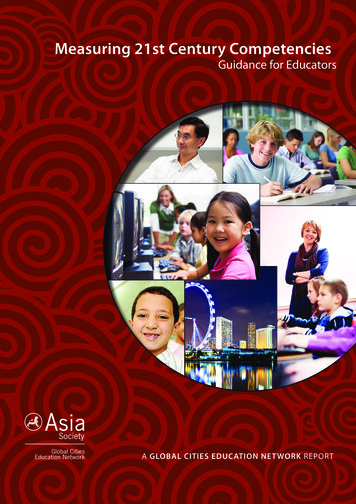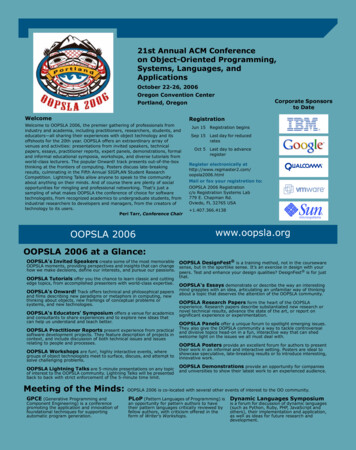
Transcription
21st Annual ACM Conferenceon Object-Oriented Programming,Systems, Languages, andApplicationsOctober 22-26, 2006Oregon Convention CenterCorporate Sponsorsto DatePortland, OregonWelcomeRegistrationWelcome to OOPSLA 2006, the premier gathering of professionals fromindustry and academia, including practitioners, researchers, students, andeducators—all sharing their experiences with object technology and itsoffshoots for the 20th year. OOPSLA offers an extraordinary array ofvenues and activities: presentations from invited speakers, technicalpapers, essays, practitioner reports, expert panels, demonstrations, formaland informal educational symposia, workshops, and diverse tutorials fromworld-class lecturers. The popular Onward! track presents out-of-the-boxthinking at the frontiers of computing. Posters discuss late-breakingresults, culminating in the Fifth Annual SIGPLAN Student ResearchCompetition. Lightning Talks allow anyone to speak to the communityabout anything on their minds. And of course there are plenty of socialopportunities for mingling and professional networking. That’s just asampling of what makes OOPSLA the conference of choice for softwaretechnologists, from recognized academics to undergraduate students, fromindustrial researchers to developers and managers, from the creators oftechnology to its users.Peri Tarr, Conference ChairOOPSLA 2006Jun 15Registration beginsSep 15Last day for reducedratesOct 5Last day to advanceregisterRegister electronically athttp://www.regmaster2.com/oopsla2006.htmlMail or fax your registration to:OOPSLA 2006 Registrationc/o Registration Systems Lab779 E. Chapman Rd.Oviedo, FL 32765 USA 1.407.366.4138www.oopsla.orgOOPSLA 2006 at a Glance:OOPSLA's Invited Speakers create some of the most memorable OOPSLA DesignFest is a training method, not in the coursewareOOPSLA moments, providing perspectives and insights that can change sense, but in the sportlike sense. It’s an exercise in design with yourhow we make decisions, define our interests, and pursue our passions.peers. Test and enhance your design qualities? DesignFest is for justthat.OOPSLA Tutorials offer you the chance to learn classic and cuttingedge topics, from accomplished presenters with world-class expertise.OOPSLA's Essays demonstrate or describe the way an interestinggrapples with an idea, articulating an unfamiliar way of thinkingOOPSLA's Onward! Track offers technical and philosophical papers mindabout a topic that deserves the attention of the OOPSLA community.and films describing new paradigms or metaphors in computing, newthinking about objects, new framings of conceptual problems orOOPSLA Research Papers form the heart of the OOPSLAsystems, and new technologies.experience. Research papers describe substantiated new research ortechnical results, advance the state of the art, or report onOOPSLA's Educators' Symposium offers a venue for academics novelsignificant experience or experimentation.and consultants to share experiences and to explore new ideas thatcan help us understand and teach better.OOPSLA Panels offer a unique forum to spotlight emerging issues.also give the OOPSLA community a way to tackle controversialOOPSLA Practitioner Reports present experience from practical Theyand divisive topics head-on in a fun, interactive way that can shedsoftware development projects. They feature description of projects in welcome light on the issues we all must deal with.context, and include discussion of both technical issues and issuesrelating to people and processes.OOPSLA Posters provide an excellent forum for authors to presenttheir work in an informal and interactive setting. Posters are ideal toOOPSLA Workshops are fun!, highly interactive events, whereshowcase speculative, late-breaking results or to introduce interesting,groups of object technologists meet to surface, discuss, and attempt to innovative work.solve challenging problems.OOPSLA Lightning Talks are 5-minute presentations on any topicof interest to the OOPSLA community. Lightning Talks will be presentedback to back with strict enforcement of the 5-minute time limit.Meeting of the Minds:GPCE (Generative Programming andComponent Engineering) is a conferencepromoting the application and innovation offoundational techniques for supportingautomatic program generation.OOPSLA Demonstrations provide an opportunity for companiesand universities to show their latest work to an experienced audience.OOPSLA 2006 is co-located with several other events of interest to the OO community.PLoP (Pattern Languages of Programming) is Dynamic Languages Symposiuman opportunity for pattern authors to havetheir pattern languages critically reviewed byfellow authors, with criticism offered in theform of Writer's Workshops.is a forum for discussion of dynamic languages(such as Python, Ruby, PHP, JavaScript andothers), their implementation and application,as well as ideas for future research anddevelopment.
gistrationInvited SpeakersInvited SpeakersInvited SpeakersPLoPOOPSLA TutorialsOOPSLA TutorialsOOPSLA TutorialsOOPSLA Onward!Onward!Onward!Educators’SymposiumResearch PapersResearch PapersResearch PapersPractitioner ReportsPractitioner ReportsPractitioner ReportsDoctoralSymposiumPanelsPanelsPanelsGPCE TutorialsGPCEGPCEGPCEDynamic LanguagesSymposiumDemosDemosDemosPosters & WelcomeReceptionDesignFest Lightning TalksLightning TalksSpecial EventIce Cream SocialPLoP TutorialGPCE TutorialsDesignFest Newcomers’ SessionInvited SpeakersInvited speakers at OOPSLA create some of the most memorable OOPSLA moments, providing perspectives and insights that can changehow we make decisions, define our interests, and pursue our passions.Dr. Guy SteeleSun Fellow Guy Steele is a researcher for SunMicrosystems Laboratories, working on theProgramming Language Research project.His research interests include Algorithms,Compilation, Distributed Systems, HighPerformance Computing, Java, Lisp Scheme,Object Oriented Programming, OperatingSystems, Programming Languages, Software, andSupercomputer design.Dr. Brenda LaurelBrenda Laurel is a designer, researcher and writer. Her workfocuses on interactive narrative, human-computer interaction,and cultural aspects of technology. She holds an M.F.A. andPh.D. in theatre from the Ohio State University. Her doctoraldissertation was the first to propose a comprehensivearchitecture for computer-based interactive fantasy and fiction.Dr. Laurel serves as Chair and graduate faculty member of the graduateMedia Design Program at the Art Center College of Design in Pasadena,California, and works as a Senior Director and Distinguished Engineer atSun Microsystems Labs in Menlo Park, California. She has publishedextensively on topics including interactive fiction, computer games,autonomous agents, virtual reality, and political and artistic issues ininteractive media.www.oopsla.orgDr. Philip WadlerPhilip Wadler is Professor of TheoreticalComputer Science at the University ofEdinburgh. He holds a Royal SocietyWolfson Research Merit Fellowship and isa Fellow of the Royal Society ofEdinburgh. Previously, he worked orstudied at Avaya Labs, Bell Labs,Glasgow, Chalmers, Oxford, CMU, Xerox Parc, andStanford, and has visited as a guest professor inParis, Sydney, and Copenhagen.Dr. Wadler appears at position 70 on Citeseer's list ofmost-cited authors in computer science; is a winnerof the POPL Most Influential Paper Award; and sitson the ACM Sigplan Executive Committee. Hecontributed to the designs of Haskell, Java, andXQuery, and is a co-author of XQuery from theExperts (Addison Wesley, 2004) and Generics andCollections in Java (O'Reilly, forthcoming). He hasdelivered invited talks in locations ranging from Aizuto Zurich.Other invited speakers will be announced onthe OOPSLA web site (www.oopsla.org) asthey are confirmed.
TutorialsTake advantage of OOPSLA tutorials! If youthink you’re too inexperienced (or tooexperienced!) to benefit from OOPSLAtutorials, please think again.OOPSLA gathers the world’s finest educatorscovering the full breadth of classic andcutting-edge topics. Our presenters not onlyhave world-class expertise, they’re alsosuccessful presenters who know how to sharetheir hard-won knowledge with you.OOPSLA will provide 57 tutorials to choosefrom. It’s a pity that the maximum that youcan take is seven! The web site has moredetails on the tutorials. Take time to find thebest tutorials for you. That time will certainlybe repaid.Coherence and Community: Exploringcoherence via group problem solvingGeorge Platts, artist and creativity consultantExperiments and successes in coherenceand team-buildingGeorge Platts, artist and creativity consultantTotally Awesome Computing: Python as aGeneral-Purpose Programming LanguageChuck Allison, Utah Valley State CollegeFind Your VoiceGail E. Harris, Instantiated Software Inc.Write Your Own User GuideLauren Wiener, Freelance Technical WriterUnderstanding Security with Patterns,Peter Sommerlad, HSR Hochschule fürTechnik Rapperswil, SwitzerlandMarkus Schumacher, Virtual Forge GmbHMaking the Most of EclipseDoug Tidwell, Eric Long, Akmal Chaudhri, IBMSOA from an Architectural ViewpointMichael Stal, Siemens Corporate TechnologySoftware Architecture - Principles,Strategies, QualitiesMichael Stal, Siemens Corporate TechnologyOrganizational Patterns: Beyond Agilityto EffectivenessNeil Harrison, Utah Valley State CollegeStorytelling with FITSteve Freeman, M3pMike Hill, ManduMaking RUP AgileMichael Hirsch, Zuehlke Engineering AGComponent Systems using OSGiPeter Kriens, AquteBuilding Service-Oriented Architectureswith Web ServicesOlaf Zimmermann, IBM ZurichPattern Writing BootcampRobert Hanmer, Lucent TechnologiesLinda Rising, Independent ConsultantThe CLOS Metaobject Protocol: GenericFunctions and Metaobject ProtocolPascal Costanza, Vrije Universiteit BrusselPair Storytelling: An Introduction toPaired Creativity and ProductivityJoseph Bergin, Fred Grossman, PaceUniversityPatterns in Communications SoftwareGreg Utas, Pentennea LLCAn Introduction to C LibraryFunctionality in TR1 and at BoostScott Meyers, Independent ConsultantDeveloping a Domain-Specific Modelerwith the Eclipse Graphical ModelingFramework (GMF)Richard Gronback, Artem Tikhomirov, BorlandSecurity Patterns and Secure SoftwareArchitectureMunawar Hafiz, University of Illinois, UrbanaChampaignConcurrent Object-OrientedProgramming for Modern ArchitecturesVijay Saraswat, Vivek Sarkar, IBM TJ WatsonResearch CenterAgility, for Managers, Programmers, andAllAlistair Cockburn, Humans and TechnologySeamless Use of Object-Oriented Modelsfrom Requirements to Software DesignHermann Kaindl, Vienna University ofTechnologyPattern-Oriented Software Architecture:Patterns for Concurrent and NetworkedObjectsDouglas Schmidt, Vanderbilt UniversityModel-Driven Development ofDistributed SystemsMarkus Voelter, Independent ConsultantDouglas C. Schmidt, Vanderbilt UniversityRapidly Designing & Testing Great UserInterfacesJeff Patton, ThoughtworksProgrammers are from Mars, Customersare from Venus: A practical guide toworking with customers on XP projectsAngela Martin, ThoughtWorksRobert Biddle, Carleton UniversityIntroduction to the Eclipse ModelingFrameworkNick Boldt, IBM Rational SoftwareMarcelo Paternostro, IBM Rational SoftwareDomain-Driven Design: Putting the Modelto WorkEric Evans, Domain Language, Inc.Programming mobile devices: AnintroductionTommi Mikkonen, Tampere University ofTechnologyA Tour of Responsibility-Driven Design,Rebecca Wirfs-Brock, Wirfs-Brock AssociatesAgile Software Development in the LargeJutta Eckstein, IT CommunicationThe Art of Telling Your Design Story,Rebecca Wirfs-Brock, Wirfs-Brock AssociatesInformation Systems Architecture:Stakeholders, Viewpoints andPerspectivesEoin Woods, UBS Investment BankSOA - From Concepts to Reality,Nicolai Josuttis, Independent ConsultantDemystifying GCC: Under the Hood of theGNU Compiler CollectionRon Cytron, Morgan Deters, WashingtonUniversity, St. LouisKenneth Zadeck, NaturalBridge, Inc.Introduction to UML 2: A Fair andBalanced OverviewBran Selic, IBM CanadaUse-Case Model Refactoring andImprovementGunnar Overgaard, Seb It Ab, SwedenKarin Palmkvist, Generic Integration AB,SwedenDynamic Programming at the Modellevel,Andy Evans, Tony Clark, Xactium LimitedDynamic languages for statically typedmindsNiclas Nilsson, Activawww.oopsla.orgTechniques and Principles for RollingYour own MethodologyAlistair Cockburn, Humans and TechnologySqueezing the Last Drop of Value out ofyour Project Management StrategiesAlistair Cockburn, Humans and TechnologyWriting Effective Use Cases for ProjectsAgile and OtherwiseAlistair Cockburn, Humans and TechnologyMaking your Methodology Crystal Clearand MoreAlistair Cockburn, Humans and TechnologyRevolutionizing Software Quality throughStatic Analysis ToolsJonathan Aldrich, Carnegie Mellon UniversityBuilding Solid Distributed EnterpriseSoftware Architectures: ArchitecturePrinciples and UML Views,Jeff Garland, CrystalClear SoftwareRichard Anthony, General Dynamics C4SystemsGenerate the repetitive, boring code how to write code generatorsNiclas Nilsson, ActivaJon-Erling Dahl, Consat Engineering ABTest-Driven Development - hands-on!Niclas Nilsson, Activa,Jimmy Nilsson, Jnsk ABRuby on Rails - a kickstartNiclas Nilsson, ActivaIncremental Releases Users &Stakeholders Will Love: How to deliverfunctionally complete valuableincremental releasesJeff Patton, ThoughtworksEffective Concurrent Programming inJavaBrian Goetz, Quiotix CorpDavid Holmes, Sun Microsystems, AustraliaRefactoring Databases: EvolutionaryDatabase DesignPramod Sadalage, ThoughtworksScott Ambler, Ronin InternationalAjax: Introduction and ArchitectureStuart Halloway, Relevance, LLCBuilding Distributed Applications withthe Sun SPOTBernard Horan, Sun Microsystems, UKRandall Smith, Sun Microsystems, USJohn Daniels, Dave Cleal, Syntropy LtdModular AOP Using Design Rules andXPIsKevin Sullivan, University of VirginiaPortland’s GreenYou might expect some rain in Portland, andrain it does, though less than in Atlanta,Birmingham, Houston, Indianapolis orSeattle. You’ll likely want an umbrella and ajacket, with typical October highs around64 F/18 C and lows around 45 F/7 C.
WorkshopsOnward!OOPSLA workshops are fun! These workshops are highly interactive events, where groups ofobject technologists meet to surface, discuss, and attempt to solve challenging problems. Youlearn a lot when you share your ideas and experiences with others in the field, and buildrelationships that are an essential part of the OOPSLA experience.The workshop topics are diverse. If you'd like to attend one of them, and haven't already done so,please contact the relevant organizers as they are responsible for managing attendance. In mostcases you will be asked to submit a short position paper in advance to ensure that the workshopis appropriate for you. We hope to see you in a workshop at this year's OOPSLA!Library-Centric Software DesignJaakko Järvi, Texas A&MJosh Bloch, GoogleDavid Musser, Rensselaer Polytechnic InstituteSibylle Schupp, Chalmers Univ. of TechnologyJeremy Siek, Rice UniversityUltra Large Scale SystemsDick Gabriel, Sun Microsystems, Inc.Linda Northrop, The Software EngineeringInstituteDoug Schmidt, Vanderbilt UniversityKevin Sullivan, The University of VirginiaEclipse Technology eXchange (ETX)Michael G. Burke, IBM T.J. Watson ResearchCenterMartin Robillard. McGill UniversityFifth "Killer Examples" for DesignPatterns WorkshopCarl G. Alphonce, University at BuffaloMichael E. Caspersen, University at BuffaloAdrienne Decker, University at BuffaloBruce Trask, PrismTechThe Sixth OOPSLA Workshop on DomainSpecific ModelingJuha-Pekka Tolvanen, University of California,BerkeleyJonathan Sprinkle, University of California,BerkeleyJeff Gray, University of Alabama atBirminghamBuilding Software for Sensor NetworksSteffen Schaefer, IBMJens Jahnke, University of VictoriaTzilla Elrad, Illinois Institute of TechnologyNetBeans Plug-In/RCP ApplicationDevelopmentTim Boudreau, Sun MicrosystemsJaroslav Tulach, Sun MicrosystemsRich Unger, NuanceEscaped from the Lab: Software Practicesin Large OrganizationsDennis Mancl, Lucent Technologies - Bell LabsSteven D. Fraser, QUALCOMMGreg Utas, Pentennea LLCBill Opdyke, North Central CollegeRicardo Lopez, QUALCOMMFrom Embedded to Enterprise. How toGet Application PortabilityPeter Kriens, AquteRob van den Berg, SiemensRichard Hall, University GrenobleBJ Hargrave, IBMMarcel Offermans, LuminisCreating an Informative WorkspaceRachel DaviesDavid HussmanFourth International Workshop on SOAand Web Services Best PracticesAnders Aas Bjerkestrand, BEKK ConsultingAli Arsanjani, IBM CorporationLars Arne Skaar, TietoEnator BankingSolutionsKerrie Holley, IBM CorporationAmir Zeid, British University in EgyptResource Management in Object SystemsCiarán Bryce, INRIAGrzegorz Czajkowski, GoogleWalter Binder, researcherFirst Workshop on Model-Based Testingand Object-Oriented Systems (M-TOOS)Wolfgang Grieskamp, Microsoft ResearchDebra Richardson, University of California atIrvineClay Williams, IBM T. J.Watson Research CenterEvent-Driven ArchitectureMamdouh Ibrahim, IBMOpher Etzion, IBMDesignFest EssaysDesignFest is a training method, not inthe courseware sense, but in the sportlikesense. It is an exercise in design with yourpeers. Test and enhance your designThe Essays track aims to enhance OOPSLAby using the special characteristics of theessay form. An essay demonstrates ordescribes the way an interesting mindgrapples with an idea. The mind and theprocess of grappling are as important asthe idea. Our ideal essay displays anunfamiliar way of thinking being applied toa topic that deserves the attention of theOOPSLA community.DesignFest qualities?is for just that. Aspart of the OOPSLA 2006 registrationprocess, you can register for DesignFest at no additional cost.www.oopsla.orgThe Onward! track provides a forum forvisions of the future of our field. Onward! isthe place to reveal the revolutionary, air theprovocative, and expose the subversive. Weespecially appreciate submissions from arange disciplines with importantcontributions for thinking about software,including Human Computer Interaction,Industrial Design, Information Systems,Psychology, Philosophy, and Cultural Studiesof all kinds.The Geography of ProgrammingElisa Baniassad, Sebastian Fleissner,The Chinese University of Hong KongModel-Based DSL FrameworksJean Bezivin, Frederic Jouault, Ivan Kurtev,Patrick Valduriez, INRIA and LINA,University of NantesKeeping Track of CrosscuttingRequirements in UML Models viaContext-Based ConstraintsFelix Buebl, Epigenomics AGConscientious SoftwareRichard Gabriel, Ron Goldman,Sun MicrosystemsA Commensalistic Software SystemSebastian Fleissner, Elisa Baniassad,The Chinese University of Hong KongPegasus: First Steps Towards aNaturalistic Programming LanguageRoman Knöll, Mira Mezini,Darmstadt University of TechnologyJDA: A Step Towards Large-Scale Reuseon the WebSeung Chan Lim, Peter Lucas,MAYA Design Inc.Collaborative Diffusion: ProgrammingAntiobjectsAlexander Repenning, University of ColoradoIntentional SoftwareCharles Simonyi, Magnus Christerson, ShaneClifford, Intentional SoftwareApplying a UML-based Agent ModelingLanguage to the Autonomic ComputingDomainIvan Trencansky, Radovan Cervenka,Whitestein Technologies SlovakiaDominic Greenwood,Whitestein Technologies SwitzerlandThe Onward! track will also include films.Watch the web site (www.oopsla.org) forinformation on these films.Portland Moves YouPortland has several forms of publictransportation, including the MAX lightrailsystem. You can take the MAX from thePDX airport directly to the OregonConference Center or to the Doubletreehotel. See www.trimet.org.You can also always call a cab:EssaysGreen Cab503.252.4422On System DesignJim Waldo, Sun Microsystems, Inc.Portland TaxiCompany503.256.5400Radio Cab503.227.1212Yellow Cab503.227.1234
Research papersResearch papers form the heart of theOOPSLA experience. Research papersdescribe substantiated new research or noveltechnical results, advance the state of the art,or report on significant experience orexperimentation.CompilationMethod-Specific Dynamic Compilationusing Logistic RegressionJohn Cavazos, Michael O'Boyle, University ofEdinburghReplay Compilation: ImprovingDebuggability of a Just-in-Time CompilerKazunori Ogata, Tamiya Onodera, KiyokuniKawachiya, Hideaki Komatsu, ToshioNakatani, IBM Research, Tokyo ResearchLaboratoryDeclarative, Formal, and ExtensibleSyntax Definition for AspectJ: A Case forScannerless Generalized-LR ParsingMartin Bravenboer, Utrecht UniversityEric Tanter, University of ChileEelco Visser, Utrecht UniversityGenericsConcepts: First-Class Language Supportfor Generic Programming in C Douglas Gregor, Indiana UniversityJaakko Jarvi, Texas A&M UniversityJeremy Siek, Rice UniversityBjarne Stroustrup, Gabriel Dos Reis, TexasA&M UniversityAndrew Lumsdaine, Indiana UniversityA Flow-Based Approach for VariantParametric TypesWei-Ngan Chin, Florin Craciun, Siau-ChengKhoo, Corneliu Popeea, National University ofSingaporeGeneric Ownership for Generic JavaAlex Potanin, James Noble, Victoria Universityof WellingtonDave Clarke, Centrum voor Wiskunde enInformaticaRobert Biddle, Carleton UniversityLanguage DesignStatically Scoped Object Adaptation withExpandersAlessandro Warth, Milan Stanojevic, ToddMillstein, University of California, Los AngelesEliminating Distinctions of Class: UsingPrototypes to Model Virtual ClassesDeLesley Hutchins, University of EdinburghJ&: Nested Intersection for ScalableSoftware CompositionNathaniel Nystrom, Xin Qi, Andrew C. Myers,Cornell UniversityVirtual MachinesFrameworks and ToolsUniform Proxies for JavaPatrick Eugster, Purdue UniversityDesign Fragments Make UsingFrameworks EasierGeorge Fairbanks, David Garlan, WilliamScherlis, Carnegie Mellon UniversityAdapting VM Techniques for SeamlessAspect SupportChristoph Bockisch, Darmstadt University ofTechnologyMatthew Arnold, IBM T. J. Watson ResearchCenterTom Dinkelaker, Mira Mezini, DarmstadtUniversity of TechnologyEfficient Control Flow QuantificationChristoph Bockisch, Sebastian Kanthak,Michael Haupt, Darmstadt University ofTechnologyMatthew Arnold, IBM T. J. Watson ResearchCenterMira Mezini, Darmstadt University ofTechnologyTypesA Formal Framework for ComponentDeploymentYu David Liu, Scott F. Smith, The JohnsHopkins UniversityEfficient Software Model Checking ofData Structure PropertiesPaul Darga, University of MichiganChandrasekhar Boyapati, University ofMichiganAn Operational Semantics and TypeSafety Proof for Multiple Inheritance inC Daniel Wasserrab, Universität PassauTobias Nipkow, Technische UniversitätMünchenGregor Snelting, Universität PassauFrank Tip, IBM T. J. Watson Research CenterPerformanceVirgil: Objects on the Head of a PinBen L. Titzer, UCLAJAVANA: A System for BuildingCustomized Java Program Analysis ToolsJonas Maebe, Dries Buytaert, LievenEeckhout, Koen De Bosschere, GhentUniversityThe DaCapo Benchmarks: JavaBenchmarking Development and AnalysisStephen M Blackburn, IntelRobin Garner, Australian National UniversityChris Hoffmann, Asjad M Khan, University ofMassachusetts at AmherstKathryn S. McKinley, University of Texas atAustinRotem Bentzur, University of New MexicoAmer Diwan, University of ColoradoDaniel Feinberg, University of New MexicoSamuel Z. Guyer, Tufts UniversityAntony Hosking, Purdue UniversityMaria Jump, University of Texas at AustinJ. Eliot B. Moss, University of MassachusettsDarko Stefanovic, University of New MexicoThomas VanDrunen, PurdueDaniel von Dincklage, University of ColoradoBenjamin Wiedermann, University of Texas atAustinwww.oopsla.orgJTL - The Java Tools LanguageTal Cohen, Joseph (Yossi) Gil, Itay Maman,Technion - Israel Institute of TechnologyA Framework for ImplementingPluggable Type SystemsChris Andreae, James Noble, VictoriaUniversity of WellingtonShane Markstrum, Todd Millstein, Universityof California, Los AngelesConcurrencyEliminating Synchronization-RelatedAtomic Operations with Biased Lockingand Bulk RebiasingKenneth Russell, David Detlefs, SunMicrosystems, Inc.A Flexible Framework for ImplementingSoftware Transactional MemoryMaurice Herlihy, Brown UniversityVictor Luchangco, Mark Moir, SunMicrosystems LaboratoriesSoftware EngineeringIsolating and Relating Concerns inRequirements using Latent SemanticAnalysisKwun Kit Lo, Man Kwun Chan, ElisaBaniassad, The Chinese University of HongKongXSnippet: Mining For Sample CodeNaiyana Tansalarak, Kajal Claypool, UMass LowellUnderstanding the Shape of JavaSoftwareGareth Baxter, Marcus Frean, VictoriaUniversity of WellingtonHayden Melton, University of AucklandJames Noble, Mark Rickerby, Hayden Smith,Victoria University of WellingtonEwan Tempero, University of AucklandMatt Visser, Victoria University of WellingtonPortland’s DowntownPioneer Courthouse SquareLocated at SW Broadway and Yamhill indowntown Portland, Pioneer CourthouseSquare is a favorite place of Portlanders.Formerly a hotel site, then a parking lot,the square was purchased by the city andredesigned as an urban open space for allto enjoy. Nicknamed “Portland's livingroom,” it’s a perfect spot to stop with acup of coffee (abundantly available onnearly every block downtown).You can take the MAX to PioneerCourthouse Square - www.trimet.org
Practitioner ReportsEducators’ SymposiumOOPSLA Practitioner Reports present experience from practical software development projects.They feature description of projects in context, and include discussion of both technical issuesand issues relating to people and processes. Practitioner report presentations are an ideal placeto hear and discuss experiences in applying new technology or processes in practical situations.Incremental SoftwareEngineering TechniquesApplications Crossing SW/HWBoundaryTowards Agile Security in WebApplicationsVidar Kongsli, Bekk Consulting ASTechniques Applied to a Real-time,Embedded, Spaceborne ApplicationAlexander Murray, Jet Propulsion Laboratory,California Institute of TechnologyMohammad Shahabuddin, Jet PropulsionLaboratory, California Institute of TechnologyThe Composition Refactoring Triangle(CRT) Practical Toolkit: From Spaghettito LasagnaEthan Hadar, Mercury Interactive SystemsIrit Hadar, Department of ManagementInformation Systems, Haifa UniversityIncremental Return on IncrementalInvestment: Engenio’s Transition toSoftware Product Line PracticeWilliam Hetrick, LSI LogicCharles Krueger, BigLever SoftwareJoseph Moore, LSI LogicEnterprise Architecture ModelingArchitectural improvement by use ofstrategic level Domain-Driven DesignEinar Landre, Statoil ASAHarald Wesenberg, Statoil ASAUsing Domain-Driven Design to evaluateCommercial Off-The-Shelf softwareEinar Landre, Statoil ASAHarald Wesenberg, Statoil ASASoftware Architecture at a LargeFinancial FirmGeorge Fairbanks, Carnegie Mellon UniversityKevin Bierhoff, Carnegie Mellon UniversityDesmond D’Souza, Kinetium Inc.Secure Trade Lane: A Sensor NetworkSolution for more reliable and moresecure Container ShipmentsSteffen Schaefer, IBMUsing Model-Driven Engineering toComplement Software Product LineEngineering in Developing SoftwareDefined Radio Components andApplicationsBruce Trask, MDE SystemsAngel Roman, MDE SystemsChanging the Language ofProgrammingThe Dynamics of Changing DynamicMemory AllocationNeil Harrison. Utah Valley State CollegeJohn Meiners, Avaya Inc.Designing APIs that Stand the Test ofTimeTimothy Boudreau, Sun MicrosystemsJaroslav Tulach, Sun MicrosystemsEvolving an Embedded Domain-SpecificLanguage in JavaSteve Freeman, M3pNat Pryce, B13 ServicesJoin us at OOPSLA's forum for educatorsin object-oriented and relatedtechnologies. This one-day symposiumoffers a venue for academics andconsultants to share experiences and toexplore new ideas that can help usunderstand and teach better. This year weare pleased to have as our keynotespeaker Willy Farrell.Willy is a Senior Software Engineer at IBMwith over 25 years of programmingexperience. Willy is a technical consultantto faculty around the world, working withIBM's Academic Initiative as part of theIBM Developer Skills team. For the past 6years he has kept busy visitinguniversities to train faculty in the latesttechnologies.Keynote AddressObjects in a Service Oriented WorldWilly Farrell, IBMPapersJava Interfaces in CS 1 TextbooksThomas VanDrunen, Wheaton CollegeA Novice's Process of Object-OrientedProgrammingMichael E. Caspersen, University ofAarhus, DenmarkMichael Kölling, University of Kent,Canterbury, United KingdomHelping Students Appreciate TestDriven Development (TDD)Jaime Spacco, William Pugh, University ofMarylandPanelsHello, M.U.P.P.E.T.S.: Using a 3DCollaborative Virtual Environment toMotivate Fundamental ObjectOriented LearningChristopher Egert, Kevin Bierre, AndrewPhelps, Rochester Institute of TechnologyPhil Ventura, St. Thomas UniversityOOPSLA panels offer a unique forum to spotlight emerging issues. They also give the OOPSLAcommunity a way to tackle controversial and divisive topics head-on in a fun, interactive waythat can shed welcome light on the issues we all must deal with. We hope that you find thesepanels informative, memorable, and entertaining.Expertiza: Students Helping to Writean OOD TextEdward F. Gehringer, Luke M. Ehresman,North Carolina State UniversityDale J. Skrien, Colby CollegeDesign Patterns: Beginnings andFuturesDedicated to the Memory of John VlissidesSteven Fraser (Moderator), QUALCOMMErich Gamma, IBMRichard Helm, Boston Consulting GroupRalph Johnson, University of IllinoisObjects and Databases: State of theUnion in 2006William R. Cook (Moderator), University ofTexas at AustinRobert Greene, VersantPatrick Linskey, BEAErik Meijer, MicrosoftKen Rugg, Progress SoftwareCraig Russell, Sun MicrosystemsBob Walker, GemStone SystemsChristof Wittig, DB4objectsYoung Guns
the OOPSLA web site (www.oopsla.org) as they are confirmed. www.oopsla.org Dr. Brenda Laurel Brenda Laurel is a designer, researcher and writer. Her work focuses on interactive narrative, human-computer interaction, and cultural aspects of technology. She holds an M.F.A. and Ph.D. in theatre from the Ohio State University. Her doctoral
